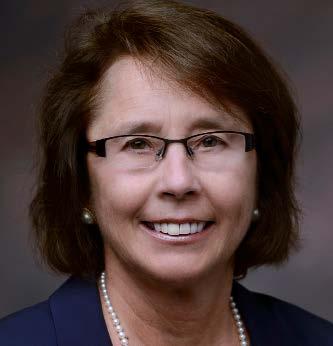
3 minute read
BOG Update
Karen A. Rizzo, MD, FACS Governor
Karen Rizzo, MD, FACS The Board of Governors was established in 1982 as the grassroots member network within the AAO-HNS. The Board of Governors is made up of local, state, regional, and national otolaryngology head and neck surgery societies from around the United States and Canada and serves as an important means of communication between the Board of Directors and grassroot members to improve programs and policies of the American Academy of Otolaryngology.
Advertisement
The Board of Governors continues to push for increased engagement and access to leadership from the private practice community. It maintains a minimum of 50% private practice members in leadership positions and continues to develop products that facilitate optimal involvement of our member societies and their constituents. There are three committees within the Board of Governors. The first is the Socioeconomic and Grassroots committee which has through cooperation with the CPT committee completed a toolkit for providers to use to help navigate category three and unlisted codes. The second is the Governance and Society Engagement committee. This has produced an online interactive map which is accessible through the academy’s website which allows members to access individual state societies and their leadership for contact information and enables states to interact in a more productive way enhancing communication to share ideas and information. This committee also determines the recipient of the Model Society Award yearly as well as the Practitioner Excellence Awards. A toolkit is in the process of being developed that will enable societies at all levels to assist in the development, growth, and improvement of their societies in various ways. The third committee is the Legislative Affairs committee which works closely with the academy's advocacy staff to follow legislative issues which impact our specialty on the state and federal level. Through these committees the Board of Governors works diligently to improve communications between The American Academy of Otolaryngology and its grassroots members. All members are encouraged to visit the website to fully appreciate the potential of this information. The American Academy of Otolaryngology recently sent letters to each of the 50 state governors, Puerto Rico, and the District of Columbia urging prioritization of otolaryngologists in the Covid 19 vaccine distribution citing our specialties particular vulnerability in treating patients with COVID-19. The Academy was also instrumental in increasing the payment classification for eustachian tube balloon dilation along with cryoablation of nasal tissue both taking effect January 1st. Despite facing significant social and economic challenges in the states, the flawed Audiology and Speech Language Pathology Interstate Compact legislation continues to be introduced around the country. Currently legislation has been filed in Georgia, Indiana, Kentucky, Maryland, Nebraska, and Washington. The Academy has several major concerns with this Interstate Compact. It has offered several amendments to the current proposals. The proposed compact creates a Commission with the power to override state laws. The states participating in the compact would have the ability to adjust scope of practice to mirror the requirements of the least restrictive states. This would allow members of the compact to bypass those states with stronger standards of practice in place designed to protect the public and maintain patient safety. Our Academy recommends that the Commission should not have this authority to change or modify the laws of the member states which define the practice of audiology and speech language pathology in their respective states. 2. There are no requirements in the compact for minutes of the Commission to be made available to the public and our Academy feels that all minutes and documents of meetings other than closed meetings should be made available to the public. 3.There is a weak definition of Telehealth and telepractice in this Compact. The AAO advocates that any
Continued on page 5






